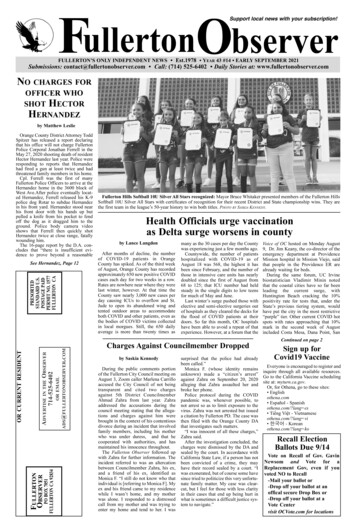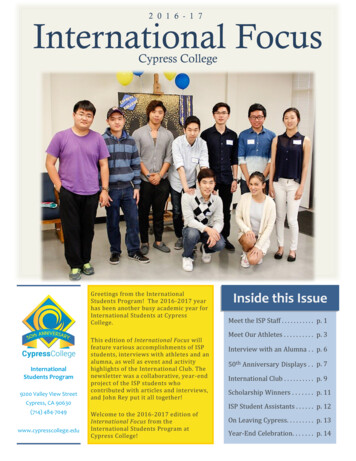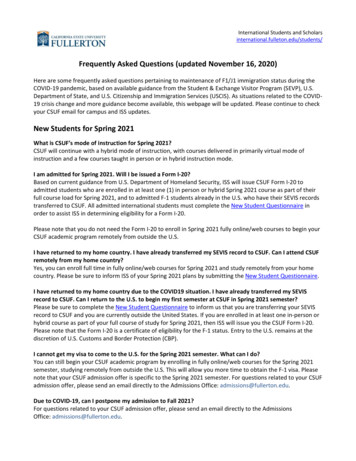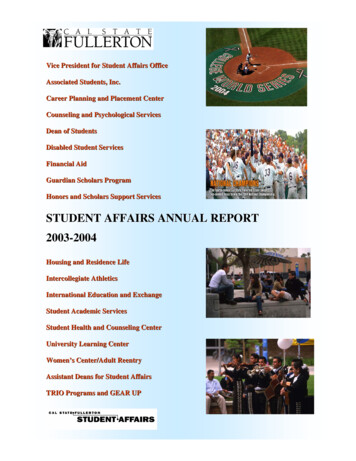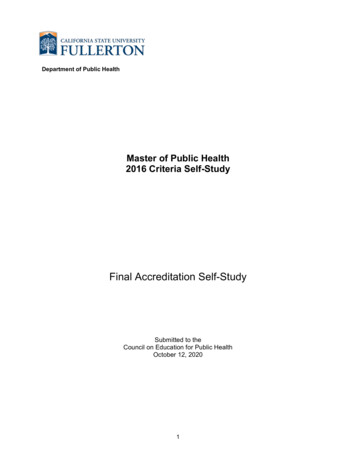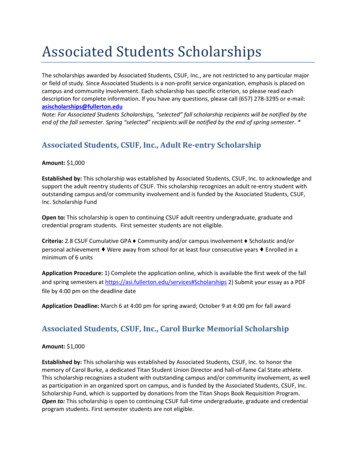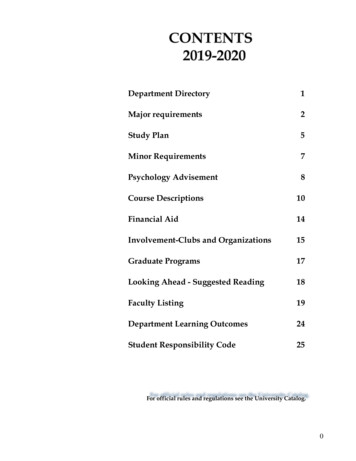
Transcription
Department Directory1Major requirements2Study Plan5Minor Requirements7Psychology Advisement8Course Descriptions10Financial Aid14Involvement-Clubs and Organizations15Graduate Programs17Looking Ahead - Suggested Reading18Faculty Listing19Department Learning Outcomes24Student Responsibility Code25For official rules and regulations see the University Catalog.0
Department OfficeH-830M (657) 278-3515(657) 278-3514Madison McKinneyH-830L(657) 278-3845mmckinney@fullerton.eduGraduate OfficeLinda PabonH-835N(657) 278-3589lpabon@fullerton.eduDepartment Administrative AnalystSue MaddoxH-835O(657) 278-3516smaddox@fullerton.eduDepartment ChairDr. Eriko SelfH-830M (657) 278-3514eself@fullerton.eduInstructional Support AssistantDaniel SohnH-613K(657) 278-3562dasohn@fullerton.eduUndergraduate PsychologyAdvisementH-830J(657) 278-3102Peer MentorsH-525B(657) 278-7538Psychology Computer LabH-607(657) 278-3386Psychology Student Conference RoomAnd Study AreaH-525http://psychology.fullerton.eduThe Department website has department forms and information about:Contacting faculty/staffGraduate programsFinancial aidAnd much more!Main Campus:Psychology DepartmentP.O. Box 6846Fullerton, CA 92834-6846Street and Shipping Address:Psychology Department800 N. State College Blvd.Fullerton, CA 92831-6846Major/minor requirementsStudent organizationsFaculty office hoursInternship sitesDepartment handoutsProfessional organizationsIrvine Campus3 BantingIrvine, CA 92618Telephone: (657) 278-1600www.fullerton.edu/irvinecampus1
(Students with Catalog Year Fall 2013 and Later;contact the advising office if you are unsure of your catalog year or would like to know ifyou can change your catalog year)Each course to be counted toward the major must be completed with a “C” or better. To earn a B.A.you must complete 120 total units. The psychology major requires a total of 41 units from the followingclasses:Lower Division Requirements (9 units)PSYC 101 Introductory Psychology (3 units)PSYC 201 Introduction to Statistics in Psychology (3 units)PSYC 202 Research Methods in Psychology (3 units)Upper Division Requirements (32 units)PSYC 300 Intermediate Research Methods and Statistics (3 units)PSYC 495 Field Placement in Psychology (3 units)Two of the following experimental psychology lecture courses (6 units):PSYC 302 Learning and MemoryPSYC 303 Sensation and PerceptionPSYC 304 Comparative Animal BehaviorPSYC 305 Cognitive PsychologyPSYC 306 BiopsychologyOne of the experimental psychology laboratory courses (2 units)PSYC 302L Lab in Learning and MemoryPSYC 303L Lab in Sensation and PerceptionPSYC 304L Lab in Comparative Animal BehaviorPSYC 305L Lab in Cognitive PsychologyPSYC 306L Lab in BiopsychologyTwo of the following courses (6 units):PSYC 331 Psychology of PersonalityPSYC 341 Abnormal PsychologyPSYC 351 Social PsychologyPSYC 361 Developmental PsychologyOne of the following courses (3 units):PSYC 311 Educational PsychologyPSYC 317 Legal PsychologyPSYC 362 Psychology of AgingPSYC 391 Industrial/Organizational PsychologyElective 300- and 400-level courses (9 units):Two 300- or 400-level electives in Psychology (6 units)One 400-level elective, excluding PSYC 495 and 494 (3 units)2
PLEASE NOTE:- No more than a total of three units of PSYC 499 (Independent Research) may be used to meet therequirements of the major.- No more than nine units of PSYC 499 may count toward graduation from the University.- No more than three units of PSYC 495 (Field Placement) may be used to meet the requirementsof the major.- No more than six units of PSYC 495 may count toward graduation from the University.- PSYC 494 (Teaching of Psychology) may not be used as an upper-division psychology elective,but 6 units may count toward units to graduate from the university.See a Psychology Advisor (H-830J) to make sure that your class choices fulfill the graduationrequirements and match your career goals.Some courses have prerequisite requirements which need to be satisfied prior to enrolling. As a generalguide the following sequences are recommended.- PSYC 201 and 202 should be taken as soon and as close together as possible. ElementaryStatistics (PSYC 201) must be taken before Research Methods (PSYC 202).- Take PSYC 300 Intermediate Research Methods and Statistics as soon as possible after you havecompleted both PSYC 201 and 202. This course is required for the lab courses PSYC 302L, 303L,304L, 305L and 306L.- Take both the lecture (PSYC 302, 303, 304, 305 or 306) and its corresponding lab (PSYC 302L,303L, 304L, 305L or 306L) from the same instructor and during the same semester if possible.- Take senior-level Psychology courses (400-level) later in your major, including the fieldplacement course PSYC 495.The Psychology Department requires majors to complete a three-credit undergraduate internship.Fieldwork can be performed in settings that emphasize Clinical Psychology, Industrial/OrganizationalPsychology, Educational Psychology, and General Psychology. Fieldwork allows students to applytheory from the classroom to a work setting, to gain insight into a career in psychology, and to obtainvaluable work experience. In certain cases, fieldwork has developed into full-time or part-time paidpositions.For more information contact:- Your Psyc 495 instructor,- Psychology Department Advisement Office in H-830J or (657) 278-3102.- CSUF internship office (CICE): http://www.fullerton.edu/cice/- Find previously used internship sites at: http://psychology.fullerton.edu/students/sites forms.aspxOnce you have completed nine units (3 courses) of upper-division psychology coursework at CSUF,with at least a 2.0 GPA, you may register for this course. Once the internship begins, expect to dosome of the following:-Work 8-10 hours per week on site for a semesterKeep a weekly journal of your site activitiesMeet with your class on a regular basis and complete class readingsObtain evaluations about your performance from your site supervisorWrite a final paper about your field placement that integrates theory and practice3
Independent research includes empirical research or library investigation under PSYC 499(Independent Research). It is a good way to get first-hand experience in an area of psychology and towork closely with a faculty member. Later these faculty members often write letters of recommendationfor graduate school or jobs. If you want to enroll in an independent study course you should:1. Read over a description of faculty research interests and on-going faculty research projects thatare listed on an IPad in the Psychology Department Office (H-830 L&M) and listed on:http://psychology.fullerton.edu/faculty/fac research.aspx. Most of the faculty have ongoingresearch projects.2. Contact the faculty member with whom you desire to work.3. Obtain permission from the instructor several weeks in advance of registration.4. Fill out the required form and turn it in to the department office before the end of the secondweek of the semester. This form must be filled out and signed by both the student and thefaculty member. The form is available for pick up in the department office or online at:http://psychology.fullerton.edu/faculty/fac research.aspxA maximum of nine units of psychology credit may be transferred from a community college towardthe major in psychology. These lower division units must fit the requirements of PSYC 101, 201 and202 as described in the university catalog. If you are in doubt as to whether the courses you have takenwill meet the requirements, please contact one of the CSUF Psychology Faculty Advisors or look upyour course on http://www.assist.org. Any additional lower division psychology units that areapproved by the university may be applied toward the required 120 units for graduation. None of theseadditional community college units may be used to meet any of the 32 upper division required units inpsychology.A limited number of upper division units in psychology may be accepted toward the psychology majorfrom another four-year college or university, keeping in mind that a minimum of 21 major units mustbe completed at CSUF. All such transfer courses must be accepted by CSUF and also must beapproved by a Psychology Faculty Advisor. To get approval bring in a copy of your unofficialtranscripts and catalog descriptions from your prior school so the advisor can assess the equivalence toCSUF classes.Occasionally students believe they have covered material in CSUF courses in previously completedwork that cannot be counted toward the CSUF major (e.g., community college DevelopmentalPsychology that cannot count toward CSUF PSYC 361). If you believe you have covered the material,you may challenge a course at CSUF. You must register for the class and follow the procedure forcredit by examination in the University Catalog.4
- SAMPLE ELECTIVE PLANSThe following are examples of electives that might be chosen for various areas of concentration. Yourstudy plan should be developed with an advisor after you have familiarized yourself with the materialin this handbook and the "Careers for Psychology Majors" booklet.Clinical/Community/CounselingPSYC 305 Cognitive Psychology (and Psyc 305L)PSYC 306 Biopsychology (and Psyc 306L)PSYC 310 Psychology of GenderPSYC 312 Human Sexual BehaviorPSYC 322 African American PsychologyPSYC 331 Psychology of PersonalityPSYC 341 Abnormal PsychologyPSYC 346 Asian American PsychologyPSYC 362 Psychology of 75481495499Theories of PersonalityPsychological TestingSleep, Dreams & BehaviorHealth PsychologyPsychopharmacologySurvey of Clinical PsychologyUndergraduate Fieldwork (Clinical)Independent ResearchPlus selected courses (which do not count toward the psychology major) in sociology, speechcommunication, human services, gerontology, health science, women's studies, public administration,foreign language and sign language.Developmental/Child/Family StudiesPSYC 302 Learning and Memory (and 302L)PSYC 305 Cognitive Psychology (and 305L)PSYC 310 Psychology of GenderPSYC 311 Educational PsychologyPSYC 341 Abnormal PsychologyPSYC 361 Developmental PsychologyPSYC 362 Psychology of tory of PsychologyCognitive ProcessesPsycholinguisticsAdvanced Developmental PsychologyUndergraduate Fieldwork (General)Independent ResearchPlus selected courses (which do not count toward the psychology major) in child and adolescentstudies, sociology, special education, teacher education, art, and music, among others.Quantitative/ResearchPSYC 302 Learning and Memory (and 302L)PSYC 303 Sensation and Perception (and 303L)PSYC 305 Cognitive Psychology (and 305L)PSYC 408 History of PsychologyPSYC 461 Psychological TestingPSYC 465 Advanced Psychological StatisticsPSYC 466 Advanced Social ScienceComputer ApplicationsPSYC 467 Multivariate StatisticsPSYC 495 Undergraduate FieldworkPSYC 499 Independent ResearchPlus selected courses (which do not count toward the psychology major) in management science,marketing, computer science, political science and/or sociology.Learning and CognitionPSYC 302 Learning and Memory (and 302L)PSYC 305 Cognitive Psychology (and 305L)PSYC 311 Educational PsychologyPSYC 408 History of PsychologyPSYC 414 Cognitive NeurosciencePSYC 415 Cognitive ProcessesPSYC 417 PsycholinguisticsPSYC 499 Independent Research5
Industrial/Organizational/PersonnelPSYC 303 Sensation & Perception (and 303L)PSYC 305 Cognitive Psychology (and 305L)PSYC 317 Legal PsychologyPSYC 331 Psychology of PersonalityPSYC 351 Social PsychologyPSYC 391 Industrial/Organizational 99History of PsychologyAdvanced Psychological StatisticsMultivariate StatisticsSleep, Dreams & BehaviorUndergraduate Fieldwork (I/O)Independent ResearchPlus selected courses (which do not count toward the psychology major) in management, politicalscience, marketing, sociology, speech communication, communications, and foreign languages.Social/PersonalityPSYC 304 Comparative Animal Behavior (and 304L) PSYCPSYC 305 Cognitive Psychology (and 305L)PSYCPSYC 310 Psychology of GenderPSYCPSYC 312 Human Sexual BehaviorPSYCPSYC 322 African American PsychologyPSYCPSYC 331 Psychology of PersonalityPSYC 346 Asian American Psychology351408431461499Social PsychologyHistory of PsychologyTheories of PersonalityPsychological TestingIndependent ResearchPlus selected courses (which do not count toward the psychology major) in sociology, political science,anthropology, management, American studies, marketing and/or speech communication.BiopsychologyPSYC 303 Sensation & Perception (and 303L)PSYCPSYC 304 Comparative Animal Behavior (and 304L) PSYCPSYC 305 Cognitive Psychology (and 305L)PSYCPSYC 306 Biopsychology(and 306L)PSYCPSYC 312 Human Sexual BehaviorPSYCPSYC 341 Abnormal Psychology408414473474475History of PsychologyCognitive NeuroscienceSleep, Dreams and BehaviorHealth PsychologyPsychopharmacologyPlus selected courses (which do not count toward the psychology major) in biology, speechcommunication, and chemistry).Animal BehaviorPSYC 302 Learning and Memory (and 302L)PSYC 304 Comparative Animal Behavior (and 304L)PSYC 371 Evolutionary PsychologyPSYC 408 History of PsychologyPSYC 414 Cognitive NeurosciencePSYC 471 Parallel Lives of Dolphins & ApesPSYC 475 PsychopharmacologyPSYC 499 Independent ResearchPlus selected courses (which do not count toward the psychology major) in anthropology.6
A psychology major is a great way to prepare for a career in teaching. Freshmen students interested inmajoring in psychology and preparing for a multiple-subject/elementary school teaching credential cando both within four years by carefully choosing their courses within the Blended Teacher EducationProgram (BTEP). Preparation for the single-subject/secondary teaching credential may be done in fiveyears. Please make appointments with a Psychology Undergraduate Advisor and Assistant DirectorLillybeth Sasis at the Center for Careers in Teaching (CCT) at H-113, (657) 278-7130, as soon aspossible. You may also visit the CCT web site at www.fullerton.edu/cct.7
Most departments at CSUF offer a minor. A minor allows you to broaden your education byconcentrating in an area beyond psychology and can also help prepare you for a range of career options.Courses taken for a minor may also be used to fulfill General Education requirements. Although aminimum of 12 units (6 of which must be upper division) in the minor must be distinct and differentfrom those in the major, any units above this minimum may be used to meet both major and minorrequirements. Please note that some minors in other fields do use psychology courses in them andthese courses may thus be “double counted” in both the psychology major and your minor.The minor allows students to receive recognition for a concentration in psychology even though theymajor in another discipline. Students majoring in areas quite different from psychology may find theminor useful in broadening their undergraduate education. In addition, students majoring in relateddisciplines (e.g., sociology, human services, criminal justice, child and adolescent studies) may find theminor useful in maximizing their career opportunities. To be counted toward the minor each coursemust be completed with a grade of "C" or better.A total of 21 units from the following courses are required:Lower Division Requirements (6 units):PSYC 101 Introductory Psychology (3)PSYC 201 Introduction to Statistics in Psychology (3)*PSYC 202 Research Methods in Psychology (3)**Upper Division Requirements (6 units):One of the following lecture courses:PSYC 302PSYC 303PSYC 304PSYC 305PSYC 306Learning and Memory (3)Sensation and Perception (3)Comparative Animal Behavior (3)Cognitive Psychology (3)Biopsychology (3)One of the following courses:PSYC 331 Psychology of Personality (3)PSYC 341 Abnormal Psychology (3)PSYC 351 Social Psychology (3)PSYC 361 Developmental Psychology (3)Electives (6 units):*Students who complete PSYC 201, or who have completed an articulated community collegeequivalent, take 6 units of upper-division psychology electives. Alternatively, students may substitutefor Psychology 201 a similar course in their major that is approved by the Psychology Department andthen take 9 units of upper-division psychology electives.**Students who complete Psych 202 or who have completed an articulated community collegeequivalent, take 6 units of upper-division psychology electives. Alternatively, students may substitutefor Psych 202 CSUF CAS 301, Math 337, Math 338, or another course approved by the department andthen take an additional 3 units of upper division electives in psychology.8
9
Special RequirementsNo more than a total of three units of PSYC 499 may be applied toward the minor. PSYC 494 may notbe used toward the minor but three units of this course may be counted toward units to graduate fromthe university. A minimum of 12 units counted toward the minor must have been completed inpsychology at CSUF.It is extremely important to see an advisor before registering for classes. The Psychology AdvisementOffice is located in H-830J, (657) 278-3102. University policy states that you should see an advisorduring your first two semesters and at least once per year thereafter. Psychology advisors areavailable most weeks on a year-round basis. Online appointments can be made by following thelink found here: http://psychology.fullerton.edu/advisement/Getting Advisement:Prior to entering CSUF or during your first semester, see one of the undergraduate advisors. Advisorsevaluate transferring psychology units, devise study plans, and answer questions about courses andfaculty members. You should also visit Academic Advisement (UH-123B) for an evaluation of yourGeneral Education (GE) units.No later than the second semester of your junior year, you should seek advisement on careeroptions with a B.A. degree or procedures for applying to graduate school. Psychology advisors(H-830J) and the Career Center (LH-208) may be consulted.It is mandatory that you apply for a graduation check (grad check) one year in advance of youranticipated graduation term. Once you meet the criteria to apply for graduation, do so online via theTitan Online Student Center. Once you have applied it is required that you make an appointment to seea Psychology Faculty Advisor. A Faculty Advisor must review and approve your Titan Degree Audit(TDA) for you to participate in commencement and be considered a candidate for graduation. TheTDA is the official grad check document and during your last term should show all requirements as“OK” (e.g., met) or IP (in progress). For grad check deadlines, criteria, and more ation.php.During the fall semester of your senior year, you should be gathering information on interviewing andresume writing from the Career Center, applying to graduate programs, or preparing for your next stepafter graduation. Early advisement and information on careers, graduate work, and placementpossibilities will help make this process much easier. Be sure to download a copy of the Careers forPsychology Majors booklet from the Psychology Department website at:http://psychology.fullerton.edu/advisement/Any student desiring help with studying can contact:- The University Learning Center in PLN-1st floor, (657) 278-2738. The ULC offers workshops onimproving studying skills, the use of computers to help studying, and individual tutoring.- The Psychology Peer Mentor Office in H- 525B- The Writing Assistance Center in PLN-1st floor, (657) 278-3650- Disabled students can find tutoring and special study aids through Disability Support Services inUH-101, (657) 278-3112.10
Each semester a selection of both required and elective courses will be offered in the evening, on arotating basis. Because not all courses in the major will be offered every semester, it will be importantfor you to plan your program carefully. The Psychology Department is committed to offering anevening degree program for students who can only attend the university after 4 p.m. Unfortunately, theevening program will not have the breadth of course offerings available during the day. Occasionallycourses will be offered on weekends as well.Most students find it necessary to work while they attend school. How many units should be taken ifyou are working? A good estimate would be:Hours worked per week403020100Maximum units per semester3691215 Following the above recommendations will allow you sufficient time to study, use the library, meetwith faculty, and maximize the chances that your grades will reflect your true potential. In addition, itwill allow you to get involved in department clubs and organizations, and other university activities.The biggest cause of academic failure and disqualification is attempting to take too many units, givenone's work schedule. If you only have enough time to succeed in two classes, it is far better for you totake 6 units and do well than it is for you to attempt 12 units and fail two of those classes. In the end,you get credit for 6 units, either way. But, if you register for just 6 units to begin with, you avoiddamaging your GPA.Attending university can at times be a very stressful experience, especially when events in one'spersonal life (family, work, friends, relationships) make it hard to focus completely on one's studies.CSUF offers several resources to help people deal with stress. These services are available at no cost tostudents.Counseling and Psychological Services (CAPS): Individual and group counseling is availableto students and is covered by student health fees that students have already s Center: Counseling and support services:http://www.fullerton.edu/womenscenter/11
PSYC 101 Introductory PsychologyConcepts, issues, and methods in psychology. Processesof sensation/perception, motivation/emotion,learning/memory, cognition. Research in developmental,personality, social, abnormal, and biological psychology.Research participation or alternate activity is required. Itis recommended that students satisfy the ELMrequirement before enrolling. (This is a general coursethat gives the student a basic introduction to the variousareas in psychology.)PSYC 110 Reasoning and Problem SolvingModels and strategies of critical thinking. Training ininductive and deductive reasoning techniques; strategiesfor self-regulation of thinking. Formal and informalfallacies; social and cognitive factors that interfere withcritical thinking and reasoning. (Psychology majors areallowed to use this course to meet the general educationcritical thinking requirement.)PSYC 201 Introduction to Statistics in PsychologyPrerequisite: PSYC 101. Descriptive statistics,probability, hypothesis testing (t, chi-square, analysis ofvariance), sampling distributions of mean and variance,correlation, factorial designs interpreting data.Laboratory applications of statistical software topsychological data. (2 hours lecture; 3 hours laboratory)PSYC 202 Research Methods in PsychologyPrerequisites: PSYC 101, 201; and completion of a GEcertified college composition course. The fundamentalsof psychological research methods. Participation inconducting experiments, analyzing data, interpretingresults, and writing research reports. (You will beintroduced to basic principles of research methodology,including field work methods, laboratoryexperimentation, and other methods of data collection inpsychology. You will also learn how to write lab reportsin the APA [American Psychological Association] style.This course is crucial for preparing you for advancedcourses.) (2 hours lecture; 3 hours laboratory)PSYC 300 Intermediate Research Methods andStatisticsPrerequisites: Completion of G.E. B.4, prior completionof PSYC 101, 201 and 202. General introduction to theuse of computers in psychology. Selection and use ofapplication programs in research, statistics, and testingwill be emphasized.PSYC 302 Learning and MemoryPrerequisites: PSYC 101, 201, 202. Students takingPSYC 302L concurrently must also have completedPSYC 300. Overview of theories and research onhabituation, classical and operant conditioning, verballearning, concept learning, and sensory, short-term, andlong-term memory. Encoding, storage, retrieval andforgetting of information.PSY 302L Laboratory in Learning and MemoryPrerequisites: PSYC 101, 201, 202, 300. Pre or corequisite: PSYC 302. Laboratory course to accompanyPSYC 302. Apply research methods to the study oftopics in learning and memory. Design, conduct, analyzeand interpret empirical research. Written research reportsrequired. (4 hours of laboratory).PSYC 303 Sensation and PerceptionPrerequisites: PSYC 101, 201, 202. Students takingPSYC 303L concurrently must also have completedPSYC 300. Anatomical, neuroscientific, and behavioralaspects of sensation and perception, mainly in humans.Covers all five senses: vision, hearing, touch, taste andsmell.PSYC 303L Laboratory in Sensation and PerceptionPrerequisites: PSYC 101, 201, 202, 300. Pre or corequisite: PSYC 303. Laboratory course to accompanyPSYC 303. Conduct, analyze and interpret empiricalresearch in the context of existing theories and findingsin the areas of sensation and perception. Writtenresearch reports required. (4 hours of laboratory)PSYC 304 Comparative Animal BehaviorPrerequisites: PSYC 101, 201, 202. Students takingPSYC 304L, concurrently must also have completedPSYC 300. Human behavior in comparison with otheranimal species within an evolutionary context, includinggenetics, feeding behavior, sensory systems,development, communications, parental behavior,mating strategies, aggression, habitat selection, andsocial organizations.PSYC 304L Laboratory in Comparative AnimalBehaviorPrerequisites: PSYC 101, 201, 202, 300. Pre or corequisite: PSYC 304. Laboratory course to accompanyPsychology 304. Laboratory and field studies in animalbehavior. Design, conduct, analyze and interpretempirical research. Written research reports and fieldtrips to local zoos required. (4 hours of laboratory).PSYC 305 Cognitive PsychologyPrerequisites: PSYC 101, 201, 202. Students takingPSYC 305L concurrently must also have completedPSYC 300. Overview of current theories and research incognitive psychology, cognitive neuroscience, andcognitive science. Topics include perception andattention, imagery, memory, language, creativity,problem solving, reasoning and decision making.12
PSYC 305L Laboratory in Cognitive PsychologyPrerequisites: PSYC 101, 201, 202, 300. Pre orco-requisite: PSYC 305. Laboratory course toaccompany PSYC 305. Apply theoretical andexperimental principles and findings in cognitivepsychology. Design, conduct, analyze, interpret, andpresent empirical research. Written research reportsrequired. (4 hours of laboratory).PSYC 306 BiopsychologyPrerequisites: PSYC 101, 201 and 202. Students takingPSYC 306L concurrently must also have completedPSYC 300. Biopsychology, including anatomy of thenervous system, neural activity, neurotransmitters, thesynapse, sensory and motor systems, biological motivesfor eating, drinking, sexual reproduction and sleep,neurology of brain damage and mental illnesses, anddrug effects/addiction in the brain.PSYC 306L Laboratory in BiopsychologyPrerequisites: PSYC 101, 201, 202, 300. Pre orco-requisite: PSYC 306. Laboratory course toaccompany PSYC 306. The mammalian brain. Design,conduct, analyze, and interpret empirical research inbiopsychology. Written research reports required. (4hours of laboratory).PSYC 310 Psychology of GenderPrerequisite: PSYC 101. Psychological research,theories and issues related to gender differences andsimilarities, emphasizing psychological characteristicsand problems of women and men, and on relationshipsbetween and within genders.PSYC 311 Educational PsychologyPrerequisite: PSYC 101. Applying psychologicalresearch and theory to educational processes, includinglearning, motivation, individual differences, teachingmethods and evaluation. This course is recommendedfor those interested in teaching careers. (This course isdesigned to give you a general idea of the ways in whichpsychological research and theory can be applied to theeducational process).PSYC 312 Psychology of Human Sexual BehaviorPrerequisite: PSYC 101. Topics in human sexualbehavior integrating biological, social, clinical, anddevelopmental aspects of sexuality. Surveys andstatistics of sexual behavior, sexual orientation, genderidentity, sexual variations, causes and treatment ofsexual dysfunctions. Legal, moral, and social issues.PSYC 317 Psychology and LawPrerequisite: PSYC 101. Impact of social scientificevidence on the legal system. Theory, research and casestudies related to issues on the death penalty, memory asevidence, police interrogations and false confessions,jury decision-making, pretrial publicity, detectingdeception and the insanity defense.PSYC 322 Black PsychologyPrerequisite: completion of the G.E. Category D.1. Usespsychological principles and practices to guide students’comprehension of life as an African American.Introduction to a holistic perspective that expands waysof conceptualizing psychology from an AfricanAmerican world view. (Same as AFAM 322.)PSYC 331 Psychology of PersonalityPrerequisite: PSYC 101. Research, theory andassessment techniques in the area of personality. (Thiscourse presents a general survey of research and theoryin the area of personality, including personalitydynamics, methods of assessing personality, social andbiological influences on personality, personalitydevelopment, etc. In general the course will focus onthe normal personality rather than on psychopathology.)PSYC 341 Abnormal PsychologyPrerequisite: PSYC 101. Symptoms, causes, treatmentand prevention of psychological disorders/psychiatricillnesses; for example, anxiety, mood, psychoticdisorders and relate
work that cannot be counted toward the CSUF major (e.g., community college Developmental Psychology that cannot count toward CSUF PSYC 361). If you believe you have covered the material, . PSYC 351 Social Psychology . PSYC 391 Industrial/Organizational Psychology . Plus selected courses (which do not count toward the psychology major) in .



